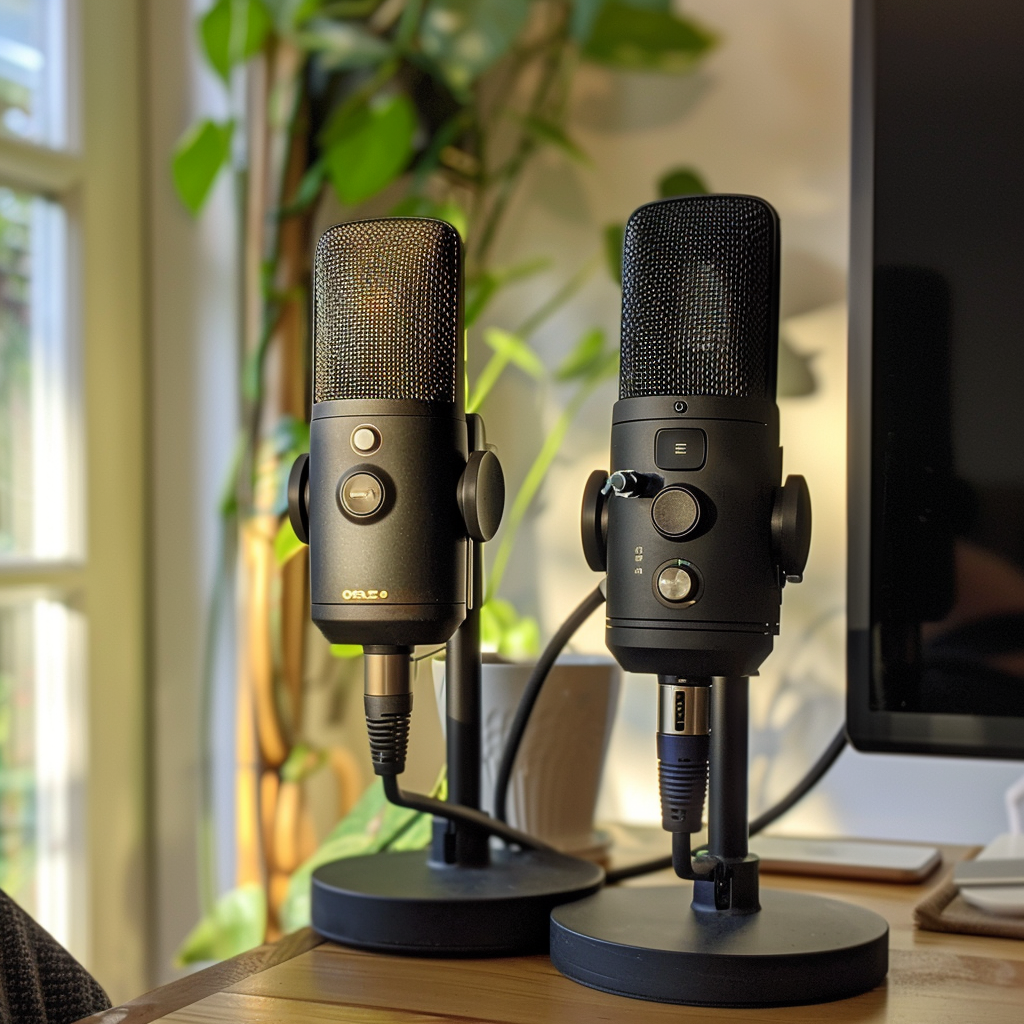Thinking about starting a business podcast? Our guide is packed with tips and tricks to help you create something amazing!

Podcasting for business is booming, and our team at Earworm knows how to make it work for you. We’ve been in the podcasting world for years, helping businesses like yours create shows that captivate and convert listeners into loyal customers.
With a podcast, your business gets a voice that’s authentic and relatable. It’s a fantastic way to share your insights, build your brand, and connect with your audience. We’ve seen it work wonders for our clients, and we’re here to guide you through every part of the process.
This guide will take you through planning, recording, editing, and promoting your podcast. Our aim is to give you the tools and knowledge you need to make podcasting a valuable part of your marketing strategy. Ready to get started?
What are the benefits of podcasts for businesses?
Podcasts are like having a direct line to your audience’s ear, literally. They let you share your expertise and personality in a convenient and engaging way. People can tune in while commuting, working out, or even cooking dinner. It’s a multitasker’s dream!
For businesses, podcasts are a goldmine. They help you build trust and authority in your niche. When you share valuable insights, interviews with industry experts, or behind-the-scenes peeks, listeners start seeing you as a go-to source of knowledge. Plus, it’s a fantastic way to humanise your brand. Hearing a friendly voice makes your business feel more approachable and real.
Another big win is the connection you create with your audience. It’s intimate and personal—your voice in their ears week after week builds a loyal community. Let’s not forget content repurposing, either. One podcast episode can be turned into blog posts, social media snippets, and even videos.
Podcasts are also cost-effective. You don’t need a Hollywood budget to get started, just some basic equipment and a bit of creativity. With the growing popularity of podcasts, you have a chance to reach new audiences who prefer listening over reading
We’d highly recommend starting a podcast for your business. It’s an excellent way to expand your reach, build authority, and connect with your audience. Our team at Earworm can help you get started and make the process smooth and fun. Get in touch today!
Planning your business podcast
Starting a business podcast might feel like trying to assemble IKEA furniture without the instructions. But don’t worry, we’ve got your back!
The first thing you need is a solid plan. Think about what you want your podcast to achieve. Are you aiming to educate your audience, share industry insights, or perhaps entertain? Your goal will shape everything else.
Next, figure out your target audience. Who do you want to reach? Understanding your listeners will help you tailor your content to their interests and needs.
Now, let’s talk format. Do you prefer solo episodes where you share your expertise, interviews with industry leaders, or maybe a mix of both? Pick a format that feels comfortable and fits your style.
Don’t forget to brainstorm a catchy podcast name. It should be something that grabs attention and reflects your business’s personality. Once you’ve got your name, think about your episode schedule. Consistency is key, whether it’s weekly, bi-weekly, or monthly.
Lastly, jot down a few episode ideas to get started. These will serve as your roadmap and keep you on track. Remember, planning is the foundation of a successful podcast. With a clear vision and a bit of creativity, you’ll be ready to hit record in no time.
Choosing the right equipment
Having the right equipment is crucial for producing a high-quality business podcast. Here’s what you’ll need to get started:
- Microphone: We’d recommend the Audio-Technica ATR2100x-USB. It’s budget-friendly, easy to use, and gives you great sound quality. Plug it into your computer, and you’re ready to go.
- Headphones: Good headphones are a must for monitoring your audio. Try the Sony MDR-7506. They’re comfy and reliable, perfect for catching every detail.
- Pop Filter: This little gadget is a lifesaver for reducing those pesky popping sounds. The Aokeo Professional Microphone Pop Filter is cheap and effective.
- Recording Software: For newbies, Audacity is a fantastic free option that works on both Mac and PC. If you want to splurge a bit, Adobe Audition offers more advanced features with a monthly fee.
- Boom Arm: Keep your mic in place and your desk neat with a boom arm. The Rode PSA1 is sturdy and adjustable, making your recording setup super flexible.
- Quiet Space: No fancy studio? No problem. Foam panels from Amazon can help dampen background noise and make your recordings sound professional.
With this gear, you’ll be all set to start recording your podcast like a pro. And if you need more tips or advice, Earworm is here to help you every step of the way.
Recording and editing your podcast
Alright, you’ve got your gear set up and you’re ready to roll. Let’s talk about recording and editing your podcast. It’s simpler than you might think, and we’re here to make it a breeze.
Finding a quiet space is imperative. You don’t need a fancy studio, but a room with minimal background noise is key. Foam panels can help if your space is a bit echoey.
When you’re ready to record, open your recording software, like Audacity or Adobe Audition. Do a quick mic check to make sure everything sounds good. Don’t worry if it feels awkward at first. Trust us, you’ll get the hang of it!
Hit record and start talking. Keep it natural and conversational. If you mess up, no biggie—just pause, take a breath, and keep going. You can edit out mistakes later. Authenticity is what listeners love.
Once you’ve recorded your episode, it’s time to edit. Editing might sound daunting, but it’s basically cutting out the bad bits and enhancing the good stuff. Use Audacity’s simple cut, copy, and paste tools to trim any mistakes or long pauses. Add some intro music to spice things up. Sites like Free Music Archive offer great royalty-free tracks.
Lastly, listen to the whole episode to catch any last-minute tweaks. Save your file in a high-quality format, like MP3.
Crafting engaging content
Creating content that hooks your listeners is where the magic happens. Think of each episode as a conversation with a friend. You want to keep things interesting, relatable, and valuable. Start with topics you’re passionate about and that resonate with your audience. This enthusiasm will naturally shine through.
Mix up your format to keep things fresh. Invite guest experts to share their insights, run a Q&A session based on listener questions, or tell compelling stories related to your industry. The variety will keep your audience coming back for more.
Structure your episodes with a clear beginning, middle, and end. Start with a catchy intro that grabs attention, dive into the main content with engaging and informative discussion, and wrap up with a strong conclusion and a call to action. This could be anything from subscribing to your podcast to checking out your latest product.
Don’t be afraid to show some personality. Humour and a conversational tone can make your podcast feel more like a chat with friends rather than a lecture. As we’ve already mentioned, authenticity is key. Listeners love genuine content.
Finally, encourage interaction. Ask for listener feedback, and suggestions, and even feature their comments or questions in future episodes. This makes your audience feel involved and valued.
Crafting engaging content is about being yourself, sharing your passion, and connecting with your listeners. If you need some more guidance, a podcast agency like Earworm is here to help you create content that captivates and converts!
Hosting and distributing your podcast
You’ve got your podcast recorded and edited, and now it’s time to get it out there. Hosting and distributing your podcast is straightforward with the right tools.
- Hosting platforms: Think of hosting platforms as your podcast’s home. We recommend Buzzsprout for its user-friendly interface and excellent support. Podbean and Libsyn are also fantastic options with robust analytics to track your podcast’s performance.
- Distribution: Once hosted, you’ll want your podcast available everywhere people listen. Your hosting platform will help distribute your episodes to major directories. Apple Podcasts, Spotify, and Google Podcasts are must-haves. These platforms make your podcast accessible to a wider audience.
- RSS feed: Your hosting platform generates an RSS feed. An RSS feed is a link that tells podcast directories where to find your episodes. Submit this feed to directories like Apple Podcasts and Spotify. It’s a one-time task that ensures every new episode gets automatically distributed.
- Website integration: Embed your podcast player on your business website. This not only drives traffic to your site but also gives your listeners another way to tune in. Most hosting platforms offer easy-to-use embed codes.
Hosting and distributing your podcast is about making it easy for people to find and listen. With the right hosting service and distribution strategy, your podcast will be ready to reach listeners everywhere.
Promoting your business podcast
Got your podcast ready and live? Awesome! Now it’s time to let the world know about it. Promoting your business podcast effectively means getting creative and using all available channels.
Your business’s social media profiles are perfect for sharing new episodes. Use LinkedIn, Instagram, and Facebook to write posts that grab attention. Incorporate eye-catching visuals and relevant hashtags to extend your reach.
Email marketing is another powerful tool in your arsenal. Include a link to your latest episode in your newsletter. Your subscribers are already interested in your business, and they’re prime candidates for podcast listeners.
Networking with other podcasters and industry influencers can significantly amplify your reach. Consider inviting them as guests on your show or offering to appear on theirs. This kind of cross-promotion can introduce your podcast to a whole new audience.
Make sure your podcast is easy to find on your website. A dedicated podcast page where visitors can listen to episodes, read show notes, and explore the topics you cover can drive traffic and increase engagement. Blog posts related to your podcast content can also boost your SEO and attract more visitors.
Encouraging your listeners to leave reviews and ratings on platforms like Apple Podcasts and Spotify can improve your podcast’s visibility and credibility. Positive reviews attract new listeners and help your podcast climb the charts.
If you have some budget to spare, targeted ads on LinkedIn or Facebook can help you reach specific audiences. This ensures that your podcast gets heard by the right people.
Promoting your business podcast might seem challenging, but with a strategic approach and a bit of creativity, you’ll see your audience grow. And remember, the Earworm team is here to provide tailored tips and strategies to help you every step of the way.
Engaging with your audience
Connecting with your audience is where the real fun begins. Ask them for feedback at the end of your episodes. Maybe throw in a question about what they want to hear next or if they have any burning questions.
Get them involved in your episodes. Imagine reading out listener questions or comments and giving shout-outs to your most active followers. This makes your podcast interactive and shows that you value your listeners’ input.
Social media is your best friend here. Share updates about upcoming episodes, behind-the-scenes snippets, and ask fun questions. Engaging posts can spark conversations and keep your audience excited about what’s coming next.
Think about organising live sessions. A real-time Q&A on Instagram or Facebook can make your listeners feel directly connected to you. It’s a great way to get immediate feedback and fresh ideas.
Don’t forget to show appreciation. A simple thank you at the end of your episodes or a special shout-out can go a long way. When listeners feel appreciated, they’re more likely to stay loyal and spread the word. It’s one of the biggest benefits of podcasting for business.
Measuring your podcast’s success
So, you’ve got your podcast up and running, and the episodes are flowing. Now, how do you know if it’s hitting the mark? Here’s how we’d gauge your podcast’s success.
- Download numbers: This is the most straightforward metric. Tools like Buzzsprout, Podbean, and Libsyn track how many times each episode is downloaded. It gives a clear picture of your audience size.
- Listener engagement: Look at how listeners are interacting with your content. Check social media comments, shares, and mentions. Tools like Hootsuite and Sprout Social can help you track this across different platforms. A lively conversation around your podcast means you’re resonating with your audience.
- Episode completion rate: Find out how many listeners are sticking around until the end of your episodes. Most hosting platforms like Buzzsprout and Podbean offer this data. High completion rates suggest your content is captivating.
- Subscriber growth: Keep an eye on your subscriber numbers. Growing subscribers mean people like what they hear and want more. Apple Podcasts Connect and Spotify for Podcasters provide detailed subscriber analytics.
- Reviews and ratings: Positive reviews and high ratings on platforms like Apple Podcasts are gold. They boost your visibility and credibility. Encourage your listeners to leave reviews by asking them directly in your episodes. Tools like Chartable can help track these metrics.
- Social media metrics: Track likes, shares, and comments on your podcast-related posts. This shows how your podcast content performs across different platforms. Again, Hootsuite and Sprout Social are great for this.
Understanding these metrics helps you see what’s working and where you might need to tweak things. Podcasting is a dynamic journey, and these insights will keep you on track.
Monetising your business podcast
Last but certainly not least, let’s talk about monetising your business podcast. Turning your passion into profit can be incredibly rewarding, and it’s more achievable than you might think.
Start by considering sponsorships. Businesses love to reach engaged audiences, and your podcast could be the perfect platform. Reach out to companies that align with your brand and propose a sponsorship deal. You can offer ad slots within your episodes, mention their products, or even create sponsored content.
Affiliate marketing is another great option. Partner with companies that have products or services your audience would love. Mention these products in your podcast and provide unique affiliate links. Every time a listener makes a purchase through your link, you earn a commission. It’s a win-win!
Don’t forget about premium content. Offer exclusive episodes, behind-the-scenes content, or early access to loyal listeners through a subscription service. Platforms like Patreon make it easy to set up and manage memberships, giving your most dedicated fans more of what they love while providing you with a steady income.
Merchandise can also be a fun way to monetise. Create branded items like t-shirts, mugs, or stickers. Not only does this bring in revenue, but it also promotes your podcast every time someone uses your merch.
Monetising your business podcast is all about creativity and finding what works best for you and your audience. With a mix of these strategies, you’ll be well on your way to turning your podcast into a profitable venture. And as always, the Earworm team is here to help you navigate this exciting journey!
Frequently asked questions (FAQs) about podcasting for business
Got questions about podcasting for your business? Our FAQs have all the answers you need.

How do I create a podcast for my business?
Creating a podcast for your business is simple. First, plan your content and decide on your target audience. Get the right equipment: a good microphone, headphones, and recording software. Record and edit your episodes, then choose a hosting platform like Buzzsprout or Podbean. Finally, distribute your podcast on platforms like Apple Podcasts and Spotify. Promote it on social media and your website.
Why would a company use a podcast?
A company uses a podcast to connect with its audience, share expertise, and build brand loyalty. Podcasts are a great way to showcase your business’s personality and engage with listeners in a personal and engaging way. They also help in reaching a wider audience and driving traffic to your website.
Do podcasts make money?
Yes, podcasts can make money. You can monetise through sponsorships, affiliate marketing, premium content subscriptions, merchandise sales, and crowdfunding. Building a loyal audience is key to generating revenue from your podcast.
Do small business owners listen to podcasts?
Absolutely! Small business owners listen to podcasts for inspiration, education, and staying updated on industry trends. Podcasts are a convenient way to gain insights and learn new strategies while multitasking.





